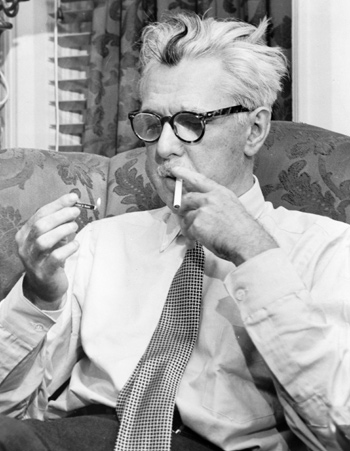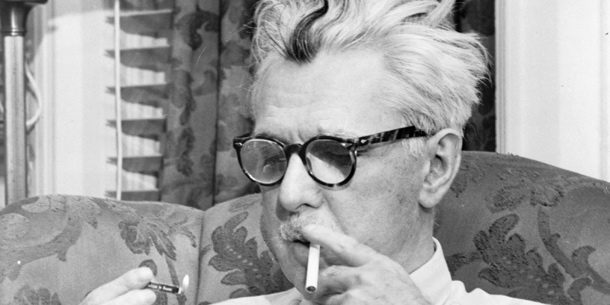
World Telegram & Sun Photo by Fred Palumbo/Library of Congress
One of the most popular writers of his day, James Thurber was, to use his own words, a wit, satirist, and humorist. As he explained, “The wit makes fun of other persons; the satirist makes fun of the world; the humorist makes fun of himself.” Named for him, the Thurber Prize for American Humor is awarded annually to recognize the art of humor writing; the 2017 winner will be announced at Caroline’s Comedy Club in New York City on October 2, 2017. The Post invited previous prize winners and finalists to share thoughts on the art of being funny today.
What characterizes modern American humor?
“People talk about the perils of being politically correct, but in a way it’s just the opposite. There’s so much more you can say now than you could 30 years ago. Louis C.K.’s comedy routines are a case in point, but there are writers who push the envelope just as far. What used to be on the edge is now family humor.”
—Calvin Trillin
Novelist, poet, food writer, regular contributor to The New Yorker; author of Quite Enough of Calvin Trillin
“I tend to write political satire. But I decided that American politics have reached the point of being sufficiently self-satirizing, so for my recent book, The Relic Master, I travel backward in time to the year 1517. And you know, I had such a good time doing it I may just stay in the 16th century. And while it’s probably true that a lot of the comic/satirical energy has shifted to TV, there’s still an awful lot of good stuff being written these days.”
—Christopher Buckley
Novelist, essayist, critic, memoirist; author of No Way to Treat a First Lady
“Humor is less filtered now than it used to be, it’s darker, more inappropriate, but at the same time humor with heart reigns supreme. It’s hard to characterize the humor scene today because it’s so diverse. It’s become a conduit for political issues, for social, class, and gender issues. Is it possible ‘funny’ is getting too ‘serious’? People still want to laugh, but they also want a really good story to go along with it.”
—Sloane Crosley
Essayist, novelist; author of I Was Told There’d Be Cake
What qualities does good humor writing have, and can it be learned?
“Essentially, you take an essential truth and twist it, turn something upside down so it’s seen in unexpected ways. That’s the heart of it. Afterward, there are matters of timing and pacing, a rhythm you need to establish. Throw in some elements of storytelling. Build up, push back, build the tension, and finally you hit the mark. I used to think humor couldn’t possibly be learned, but now I absolutely believe it can. ”
—Laurie Notaro
Journalist, novelist; author of The Idiot Girl and the Flaming Tantrum of Death
“I don’t know how Thurber would do these days. His agent would probably tell him he needs to get a sitcom before he can shop his book around.”
—Dan Zevin
“I think you can analyze what makes good humor. And you can sum up techniques of how to make it work. But something like that would end up in the Journal of Structural Engineering. It would be that dull.”
—John Kenney
Novelist, regular contributor to The New Yorker; author of Truth in Advertising
Where does humor come from? Is there a humor impulse?
“I don’t think it’s a humor impulse. It’s a story impulse. After the idea comes to you, you have to think what form it will work best in — a short piece, a novel, the theater, late-night TV show. I’m blessed that I’ve been able to work in all those forms, so I can decide which one works the best. Maybe next I’ll try writing a pamphlet.”
—Alan Zweibel
Screenwriter (Saturday Night Live), playwright, novelist; author of The Other Shulman
Do you find humor comes out of your own experiences?
“Of course, although I had trouble finding anything funny about turning 80. At least I don’t have to take my shoes off at the airport anymore.”
—Calvin Trillin
Do you see any difference in the humor between men and women?
“I think men and women are equally funny, but because men’s experiences are way different from women’s, it makes for a difference in perspective. That makes us different but equal in a number of ways.”
—Laurie Notaro
“Tina Fey and Lena Dunham have both written staggering, laugh-out-loud funny books. Many of the funniest people writing today are women.”
—John Kenney
Do the internet and social media have an impact on contemporary humor?
“I find a lot of cool, interesting voices on the internet that you won’t find anywhere else. You can publish and reach an audience there that you can’t anywhere else. That means that someone in Minnesota who works at a power company can publish short pieces of comedy that people anywhere in the world can find and laugh at. Through the internet, the sky’s the limit as far as creativity.”
—Steve Hely
Screenwriter (30 Rock, The Office); Author of How I Became a Famous Novelist
Would you consider the humor on American television to be literary in its broadest sense?
“Only written humor, written by one person, published on paper, in a book or magazine, is literary humor. TV sitcom scripts, screenplays, blog posts, transcripts of stand-up routines are all fine, but none come close to literary humor. Every so often, a work of literary humor lasts forever. A few pieces by Thurber fall in that category. Ditto S.J. Perelman and Robert Benchley. Roy Blount is a great literary humorist, as are Garrison Keillor and David Sedaris.
—Ian Frazier
Essayist, staff writer at The New Yorker; author of Lamentations of the Father
“From a book-publishing perspective, I think humor writing is in great shape, just as long as you’re a famous TV star. I don’t know how Thurber would do these days. His agent would probably tell him he needs to get a sitcom before he can shop his book around town. Or at least he’d need an Instagram account. He’d probably be taking selfies with his dogs instead of drawing them.”
—Dan Zevin
NPR contributor; author of Dan Gets a Minivan: Life at the Intersection of Dude and Dad
Laugh Lines
On Parenting: “Parenthood is an amazing opportunity to be able to ruin someone from scratch.”
—Jon Stewart
On Social Media: “Getting your news from Twitter is like asking a cat for directions.”
—Andy Borowitz
On Politics: “Politicians and diapers must be changed often, and for the same reason.”
—Mark Twain
On Marriage: “Never marry a man you wouldn’t want to be divorced from.”
—Nora Ephron
On Religion: “Anyone who thinks sitting in church can make you a Christian must also think that sitting in a garage can make you a car.”
—Garrison Keillor
On Taxes: “Tax reform is taking the taxes off things that have been taxed in the past and putting taxes on things that haven’t been taxed before.”
—Art Buchwald
On Women: “Women are wiser than men because they know less and understand more.”
—James Thurber
On Death: “That would be a good thing for them to cut on my tombstone: Wherever she went, including here, it was against her better judgment”
— Dorothy Parker
Become a Saturday Evening Post member and enjoy unlimited access. Subscribe now



